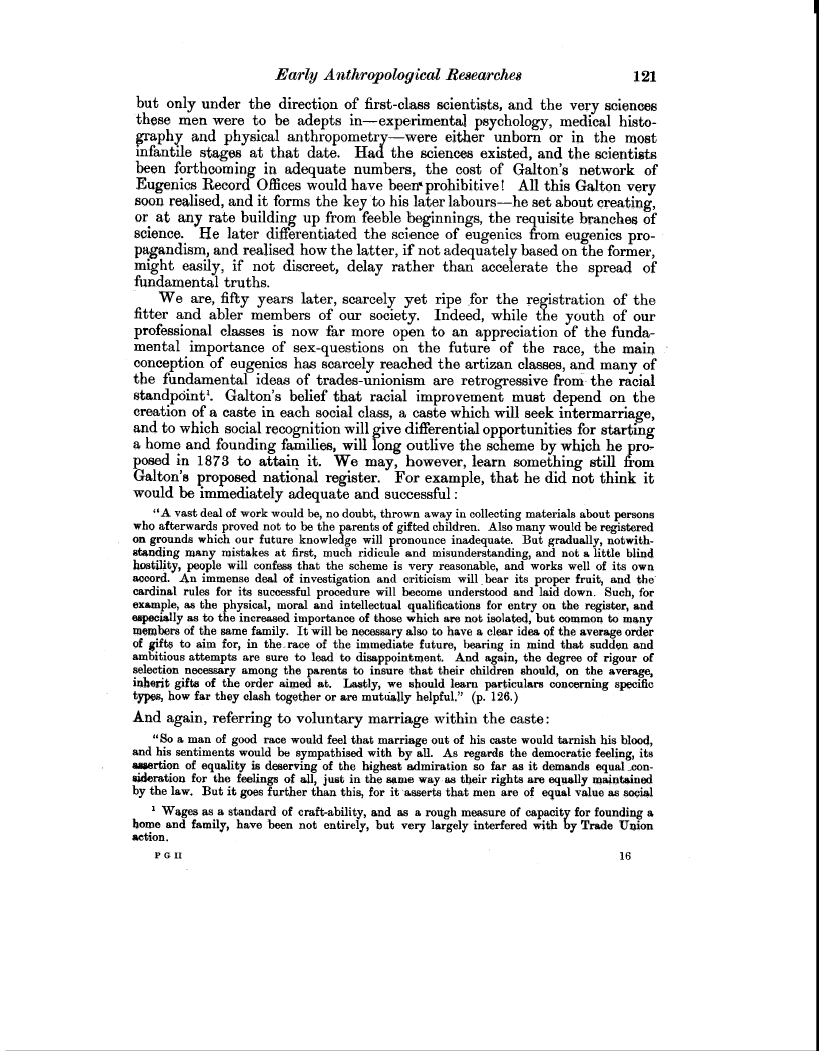Early Anthropological Researches 121 but only under the direction of first-class scientists, and the very sciences these men were to be adepts in-experimental psychology, medical histo
rraphy and physical anthropometry-were either unborn or in the most infantile stages at that date. Had the sciences existed, and the scientists been forthcoming in adequate numbers, the cost of Galton's network of Eugenics Record Offices would have been' prohibitive! All this Galton very soon realised, and it forms the key to his later labours-he set about creating, or at any rate building up from feeble beginnings, the requisite branches of science. He later differentiated the science of eugenics from eugenics propagandism, and realised how the latter, if not adequately based on the former, might easily, if not discreet, delay rather than accelerate the spread of fundamental truths.
We are, fifty years later, scarcely yet ripe for the registration of the fitter and abler members of our society. Indeed, while the youth of our professional classes is now far more open to an appreciation of the fundamental importance of sex-questions on the future of the race, the main conception of eugenics has scarcely reached the artizan classes, and many of the fundamental ideas of trades-unionism are retrogressive from- the racial standpoint'. Galton's belief that racial improvement must depend on the creation of a caste in each social class, a caste which will seek intermarriage, and to which social recognition will give differential opportunities for starting a home and founding families, will long outlive the scheme by which he proposed in 1873 to attain it. We may, however, learn something still from Galton's proposed national register. For example, that he did not think it would be immediately adequate and successful
"A vast deal of work would be, no doubt, thrown away in collecting materials about persons
who afterwards proved not to be the parents of gifted children. Also many would be registered on grounds which our future knowledge will pronounce inadequate. But gradually, notwithstanding many mistakes at first, much ridicule and misunderstanding, and not a little blind hostility, people will confess that the scheme is very reasonable, and works well of its own accord. An immense deal of investigation and criticism will bear its proper fruit, and the cardinal rules for its successful procedure will become understood and laid down. Such, for example, as the physical, moral and intellectual qualifications for entry on the register, and especially as to the increased importance of those which are not isolated, but common to many members of the same family. It will be necessary also to have a clear idea of the average order of gifts to aim for, in the.race of the immediate future, bearing in mind that sudden and ambitious attempts are sure to lead to disappointment. And again, the degree of rigour of selection necessary among the parents to insure that their children should, on the average, inherit gifts of the order aimed at. Lastly, we should learn particulars concerning specific
types, how far they clash together or are mutually helpful." (p. 126.)
And again, referring to voluntary marriage within the caste
"So a man of good race would feel that marriage out of his caste would tarnish his blood,
and his sentiments would be sympathised with by all. As regards the democratic feeling, its assertion of equality is deserving of the highest admiration so far as it demands equal consideration for the feelings of all, just in the same way as their rights are equally maintained
by the law. But it goes further than this, for it asserts that men are of equal value as social
' Wages as a standard of craft-ability, and as a rough measure of capacity for founding a home and family, have been not entirely, but very largely interfered with by Trade Union
action.
ron 16

